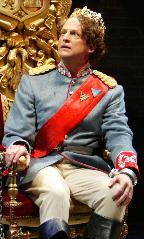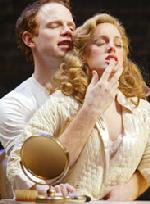SEARCH CurtainUp
REVIEWS
FEATURES
NEWS
Etcetera and
Short Term Listings
LISTINGS
Broadway
Off-Broadway
BOOKS and CDs
OTHER PLACES
Berkshires
London
LA/San Diego
Philadelphia
Elsewhere
QUOTES
On TKTS
LETTERS TO EDITOR
FILM
LINKS
MISCELANEOUS
Free Updates
Masthead
NYC Weather
Valhalla
|
I believe -- that the world should be beautiful. That God wants the world to be beautiful. But it isn't --- Ludwig valhalla: a heavenly place--peaceful and beautiful--where those who are favored by the gods can go when they die --- Webster's Unabridged Dictionary |

Peter Frechette
(Photo: Joan Marcus) |
Even if the whole cast weren't spectacularly good, Frechette's marvelously "mad" and quite lovable King Ludwig would be enough to make a trip to the New York Theatre Workshop obligatory. As Frechette's Ludwig makes his pursuit of beauty the better part of wisdom, so the Rudnickian humor makes you forgive the ornate excesses of his plot.

Scott Barrow & Sean Dugan
(Photo: Joan Marcus) |
The theme that connects Rudnick's re-imagined though fact-based Bavarian royal and the not so average fictional Texas lad of the 1930s and 1940s is a passionate yearning to find a world that values beauty and kindness instead of disdaining their special sensibilities. Though Mr. Rudnick has declared himself to be "operaphobic" he's certainly managed to make much of the opera loving Ludwig's fondness for Richard Wagner. Thus in Valhalla, if not the playwright's life, opera (especially the swan in Lohengrin) is the leitmotiv behind his Teuton and Texan's quest for a life of beauty and grandeur.
The unlikely paralells between Ludwig and James begin with the former in a blue velvet Little Lord Fauntleroy suit and long curls and the latter in raggedy short pants. Each is seen obsessively "falling in love" for the first time. Ludwig obsesses over a real swan in the lake of the family estate, James over a crystal swan he's stolen from the town's department store. Fast forwarding to early adolescence, both boys are next seen dealing with their difficult mothers. While the Queen Mother is less mean spirited than Margaret Avery (Candy Buckley, impressive both as the tough Texas mom and the ambitious Queen) reprimand the boys about displeasing their fathers. There's a particularly hilarious exchange in which Queen Marie tells Ludwig that his irresponsible behavior has infuriated his father (Ludwig: "I don't care!." . .Queen: "He's the King!". . .Ludwig: "I'm the Prince!". . .Queen: "I'm the Queen!". . .Ludwig: " Gin!")
The boys' trajectory from boyhood to manhood and beyond encompasses a stint in reform school for the bi-sexual James and his relationship with Henry Lee Stafford (Scott Barrow, who also does well by two less reluctant sexual partners for Ludwig) and the department store owner's daughter Sally Mortimer (the uniformly engaging Samantha Soule ). In counterpoint, Ludwig is introduced to sex by Helmut, his fitness instructor (Barrow again) and to potential consorts by his Deputy Secretary Pfeiffer (the excellent Jack Willis, whose six roles include a statuesque princess). Sophie (one of Soule's five bravura performances), the princess of Ludwig's choice has a very visible humpback -- but no matter; you see, she shares his passion for opera and this leads to Ludwig's learning to adjust his vision of beauty -- as James later discovers that beauty (in the form of a beautiful Nazi) can kill.
The above only begins to touch on the events which finally bring that little crystal swan back into the picture and update James and Ludwig's stories via a tour guide named Natalie Kippelbaum (Buckley once again) and an Avery heir (Soule, in her final incarnation). To appreciate the wit of what Mr. Rudnick has wrought, you need to be in the theater to hear the dialogue delivered by Frechette and company. And you need to see Christopher Ashley's never-a-dull-moment staging which includes a breathtakingly dramatic wedding scene that juxtaposes a Texas church wedding that includes a surprise bride with Ludwig's euphoric account of the Lohengrin nuptials.
As the relatively small ensemble fills the stage as if the six were more than a dozen, so Thomas Lynch has created a setting for them that is at once spare and lavish. The two big pillars -- one unadorned brick, the other wrapped in gold -- artfully capture the two oceans apart worlds. At one point, a drop-down railing converts the stage into a World War II bound army ship for a scene that has James persuade Henry Lee that they can avoid getting killed simply by being in the right movie. This leads to a raucous Anchors Aweigh ditty with a catchy double entendre refrain of "Because soldiers need seamen/To keep them afloat."
Not to be discounted for their contribution to the evening's pleasures are the costumes. The sleight-of-hand speed with which the actors get in and out of the ubiquitous William Ivey Long's gorgeously on target costumes is truly mind boggling. Kenneth Posner's lighting and Mark Bennett's sound design further enhance the production.
Ultimately Valhalla is about two men who are as gay as can be, yet its appeal is no more strictly to gay audiences than Take Me Out was. The main characters' sexual preferences are simply one way to show the common strands connecting people even when they live in different worlds and times. Our own dreams of beauty may run to less rococo splendor than Ludwig's -- but the urge to beautify the much simpler castles we call home springs from the same need to escape from the spiritual and physical ugliness of the world we live in.
The mention of Take Me Out is not intended to imply that Valhalla rivals the heft of that play. It is fun, as enjoyable as a slice of Sacher Torte. And in case some of the gorgeous Wagner riffs aren't your thing, the playwright has also provided a gavotte that turns into a snappy "Sing. Sing. Sing" jitterbug.
|
Valhalla
Written by Paul Rudnick Directed by Christopher Ashley Cast: Scott Barrow (Henry Lee Stratford, Helmut, Singer); Candy Buckley (Margaret Avery, Queen Mary, Princess Enid, Natalie Kippelbaum); Sean Dugan (James Avery), Peter Frechette (King Ludwig of Bavaria), Samantha Soule (Sally Mortimer, Princess Sophie, Princess Patricia, Marie Antoinette, Anne Avery), Jack Willis (Footman, Otto, Pfeiffer, Princess Ursula, Reverend Howesbury, Sergeant). Set Design: Thomas Lynch Costume Design: William Ivey Long Hair and Wig Design: Robert-Charles Vallance Lighting Design: Kenneth Posner Choreography: Daniel Pelzig Fight Direction: Rick Sordelet Original Music and Sound Design: Mark Bennett Running time: 2 hours with one intermission. New York Theatre Workshop, 79 E. 4th St., 212-239-6200 1/16/04 to 4/04/04; opening 2/05/04.-- earling closing: 3/21/04 Tue - Sat at 8pm; Sun at 7pm; Sat & Sun at 2pm --$60 . Reviewed by Elyse Sommer based on 2/04 press performance |

Mendes at the Donmar
Our Review

At This Theater

Leonard Maltin's 2003 Movie and Video Guide

Ridiculous!The Theatrical Life & Times of Charles Ludlam

Somewhere For Me, a Biography of Richard Rodgers

The New York Times Book of Broadway: On the Aisle for the Unforgettable Plays of the Last Century

6, 500 Comparative Phrases including 800 Shakespearean Metaphors by CurtainUp's editor.
Click image to buy.
Go here for details and larger image.



